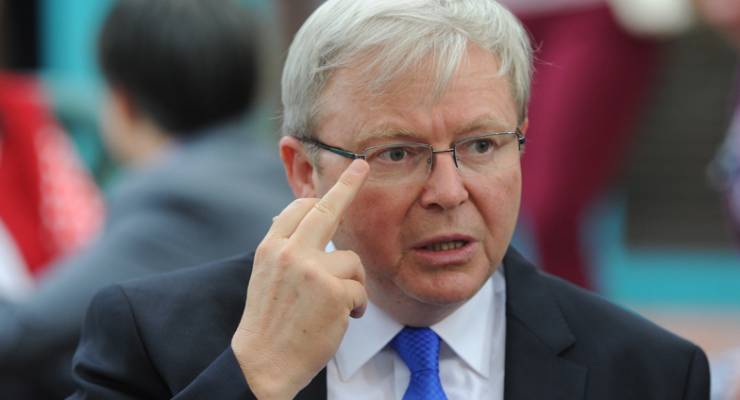
Six months after reports emerged of Kevin Rudd and Malcolm Turnbull discussing the former prime minister’s bid for the top job at the United Nations, the office of the prime minister has said it has lost any records of the conversation.
At the end of July last year, Prime Minister Malcolm Turnbull announced he would not support Rudd’s bid for the United Nations secretary-general position, ultimately ending Rudd’s campaign. In response, Rudd claimed that Turnbull had backflipped on his position, saying Turnbull and Foreign Minister Julie Bishop had both indicated several times that the Australian government would back Rudd for the UN role.
Rudd released a set of letters he said showed Turnbull was making positive noises on supporting Rudd’s bid. Included in one of the letters was that Rudd had been communicating with Turnbull on the encrypted communications app Wickr:
“You in fact sent me a message on your preferred Wickr system where you stated that you and the FM [foreign minister] were ‘as one’ in your support for my candidature.”
Wickr is one of several apps used by various ministers and staff to communicate with one another. Wickr messages disappear from the server after a time period set by the user and are self-destructing.
While this means better security for some communications than SMS or email, for ministers and their staff to use the app creates issues over transparency in government, particularly when conducting government business over the application.
When Turnbull became prime minister he sought advice from Australian Signals Directorate over what apps he should and should not use in his office, and was informed that classified material should not be communicated over apps not approved by ASD, such as WhatsApp or Wickr, but regular everyday business was allowed.
While taking the appropriate security precautions, the government is overlooking its transparency obligations. In estimates in October last year, PM&C deputy secretary for national security Allan McKinnon said that “if there is a document created, then it is subject to FOI” and deputy secretary for governance Elizabeth Kelly said that PM&C “maintains information in a way” that allows FOI requests to be dealt with. Attorney-General George Brandis, the minister responsible for FOI, said that such a request would be possible.
“An FOI request would be processed in the normal way and any form in which a document that is potentially answerable to the request is retained would be the subject of appropriate inquiry,” he said.
This means that if government business is being discussed over applications like Wickr, it should be subject to freedom of information law.
In August last year, Crikey filed a freedom of information request for the conversations, but this week — six months later — the Prime Minister’s Office said it had no record of any conversation.
“Searches were made by staff in the office of the prime minister for any documents within the scope of your request. As a result of these searches I have identified no documents within the scope of your request, ” Alistair Campbell said.
Crikey has appealed the decision to the Office of the Australian Information Commissioner.
In answers to questions on notice published this week, the Department of Prime Minister and Cabinet said it was not aware of the Wickr conversation between the PM and the former PM.








How convenient.
The government have missed an opportunity by not putting George Brandis’s diary on Wickr – they could have used the same excuse to foil Mark Dreyfus’s bid for access.
Talcum Trumble has certainly proved to be agile & innovative when it comes to deceit, prevarication and mendacity.
If you’ve nothing to hide, you’ve nothing to fear; why is Malcolm Turnbull hiding stuff via Wickr?